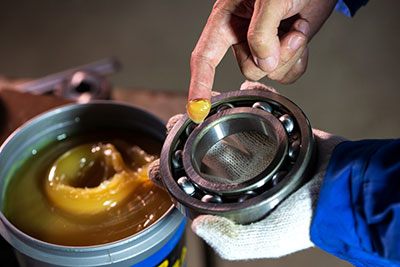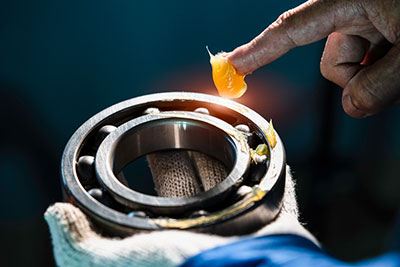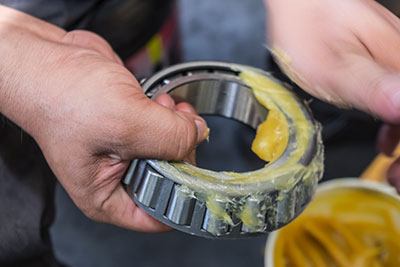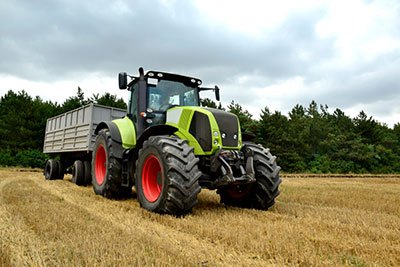Are you a tractor owner or farmer looking to keep your important investment in tip-top condition? Then you’re likely wondering what type of grease is best for your tractor. With so many options on the market, it’s important to find one that meets all the needs of your vehicle and its associated components.
We’ve put together this definitive guide to help choose the right kind of grease for your tractor! We’ll look at various types, discuss their pros and cons, and provide some tips on how to apply them safely.
So, read on to learn more about greases that will make sure your vehicle keeps running smoothly!
Take Away Key Points
- Greases help maintain the better performance of your tractors
- Greases have different types, so you should know which one is the best for your needs
- Greases use different components, so find the most suitable ones for your machinery
Table of Contents
- Grease types to use for high-torque machines: All you need to know
- FAQs
- How do I know what kind of grease to use?
- What are the different types of greases?
- What is #1 vs. #2 grease?
- What is the best grease to use on a tractor?
- Can I use marine grease on my tractor?
- Does the tractor supply have grease?
- How to get tractor grease out of clothes?
- Why do you need to grease the tractor?
- How does a zerk work?
- Is there a set greasing schedule for all the tractor fittings?
- How do you know when you’re done greasing?
- Conclusion
Grease types to use for high-torque machines: All you need to know
Greases or lubricant oils are used to keep different vehicles lubricated and optimal for further use.
However, not every oil type can be used for all machines, and there are different features explaining each of them.
So, let’s see the most prominent oil types their benefits, and their main purpose.
What is tractor grease and its main purpose?

Tractor grease is a type of lubricant used to reduce friction between moving parts in tractors and other agricultural or construction equipment. It helps to protect the machinery from wear and tear, as well as prevent corrosion.
Tractor grease is designed to be heavy-duty and long-lasting, so it can withstand the tough conditions that come with working on a farm or in a construction environment. It also helps to reduce noise levels and keep the machinery running smoothly.
The main purpose of tractor grease is to ensure that the machinery runs efficiently and safely for as long as possible.
Different types of grease
Below you can find different types of grease for your machinery.
The greases can be applied to various machines, including food machinery, automotive service greases, marine grease and boat trailers, moving surfaces, friction, inorganic thickeners, metallic soaps, and other multifunctional units.
So, let’s find the best one for your needs.
1. Calcium grease
Calcium grease is a multi-purpose lubricant that was designed for general use.
It offers excellent water resistance, corrosion protection, and mechanical stability, making it ideal for a range of industries including marine, industrial, automotive, and agricultural applications.
However, its performance may deteriorate as temperatures increase so it is best used in cooler environments.
2. Lithium grease
Lithium grease is renowned for its strong properties; it offers great durability and viscosity, as well as resistance to oxidation, corrosion, extreme temperatures, and wear & tear.
It has excellent lubrication qualities and water resistance, making it ideal for high-pressure or shock loads in a range of different applications such as automotive, gardening, industrial, and household use – not to mention metal-to-metal demands.
3. Lithium vs. calcium grease for tractor: What’s better lubricating oil?
When it comes to oils for tractors and other farm machinery, there is no clear-cut answer as to which type of grease is better: lithium or calcium. Both types have their advantages and disadvantages.
Lithium-based grease is generally more resistant to water and high temperatures than calcium grease, making it a good choice for applications that involve exposure to moisture or extreme temperatures. These types of grease include metal-to-metal applications and a higher melting point than other greases based on calcium.
It also has good stability, meaning it can last longer without breaking down over time. But, it’s also the right grease for higher temperatures, as it will not cause increased wear on your machinery.
On the other hand, calcium-based greases tend to perform better in terms of oxidation resistance, dropping point, and wear protection than lithium grease. Additionally, calcium sulfonate greases are typically more cost-effective than lithium complex greases.
These types of grease are also ideal when used to reduce friction. They won’t cause increased wear to your machines.
Ultimately, the best choice of lubricating oil depends on the specific application and environment in which it will be used. For instance, if the application involves frequent exposure to moisture or higher temperatures, then lithium grease may be the better option.
However, if cost is a major factor or if wear protection is a priority, then calcium grease may be preferable, as lithium grease is more expensive than calcium grease.
4. Aluminum complex grease

Aluminum complex grease has many benefits; it is especially resistant to extreme temperatures, rust, oxidation, and water, and it offers superior resistance to shearing and good shear stability.
You can often find it in the food industry but it’s also used in other industries as well, such as steel milling, automotive, steel milling, farming, and construction.
5. Barium complex grease
Barium complex grease is a high-performance lubricant noted for its:
- mechanical stability,
- temperature tolerance,
- load,
- speed resilience,
- excellent water tolerance,
- oxidation stability, and
- resistance to various chemicals.
It is often used in tough applications such as those found in industrial machinery, aeronautics, marine engineering, and manufacturing.
6. Clay/bentone grease
Bentone grease represents a clay-based lubricant, made with the help of bentonite clay.
It offers amazing wear-and-tear protection, temperature tolerance, the best water resistance, mechanical stability, and adhesiveness.
It’s also known as a non-melt lubricant due to its lack of a dropping point.
The lubricant oil is mainly used n demanding settings such as manufacturing, construction, steel production, mining, and various ceramic applications.
7. Sodium grease
Sodium grease is a combination of soda soap and base oils with different additives. The lubricant oil provides rust protection, good lubrication, good shear stability, and a high dropping point.
However, the grass offers poor water resistance, so it might not be the best solution for your needs. The same rules apply to oxidation stability – it’s also poor. Thus, sodium grease is usually applied to lubricate rolling contact bearings.
But, you can sometimes combine it with different types of grease and produce a higher-quality product.
You can think of all of these different types of grease as multipurpose (MP), extreme pressure (EP), heavy-duty, specialty, marine, automotive, or industry. But their main purpose will mainly depend on the unique combination of their base oils, thickeners, and additives.
8. Polyurea grease
Polyurea grease is incredibly popular due to its fantastic benefits, such as:
- outstanding water resistance,
- excellent oxidation stability,
- rust and corrosion prevention,
- durability,
- versatility,
- good mechanical stability
- great high-temperature performance.
Because of these properties, it is suggested for long-lasting applications and utilized in a variety of industries. It is considered essential for the optimal lubrication of electric motors and steel plants.
9. Silicone grease for wheel bearings
Greases that are silicone-based and created specifically for high temperatures, such as wheel bearings, must be used.
These types of greases are designed to remain sturdy in high temperatures and any elements encountered by wheel bearings.
The silicone grease can be utilized for chassis components too. However, it is not interchangeable with chassis lubrication.
10. Moly grease
Certain producers, such as Ford, require the use of molybdenum or “moly” to protect metal components.
This type of grease is an all-purpose lubricant including molybdenum disulfide. Thus, the grease offers high-pressure protection and extra anti-wear protection for disc brake wheel bearings.
The moly grease is ideal for more extended use in all chassis lubrication.
11. Dielectric grease
A cloudy white paste, created from silica and silicone, is made for delicate parts such as electronics. It safeguards against galvanic corrosion, the kind that has an impact on high-voltage electronic components.
When applied to spark plug boots, dielectric grease provides a seal to protect the plugs from corroding and stops the boots from sticking to them.
Dielectric grease should not be utilized in switches that involve arcing. Such actions may turn silicone into silicon carbide, leading to failure.
National Lubricating Grease Institute & tractor greases
The National Lubricating Grease Institute (NLGI) states that tractor greases should be designed to meet the specific needs of the application.
Tractor greases are typically designed with a combination of base oils and additives to reduce friction and protect against wear, rust, corrosion, oxidation, and high temperatures.
NLGI also recommends that tractor grease should be selected based on its compatibility with other lubricants used in the system, as well as its ability for excellent resistance to water washout.
But, to use the right lubrication and ideal grease type, and fulfill different performance requirements, such as:
- reducing friction,
- withstand water,
- withstand heavy loads and higher speeds,
- work under extreme pressure and
- protect sensitive components, of your tractors,
you must know about the grease components first, which brings us to another part of the guide.
Choosing the right grease for your high-torque vehicle
You need o consider several factors before choosing the best tractor greases for your tractors. Your right crease can depend on the following:
1. High viscosity
High viscosity affects its ability to remain consistent and offers adequate protection from friction.
High viscosity is preferred for heavy, slow-load applications while lower viscosity is preferable for high-speed operations.

2. Consistency
The NLGI uses a system of grades to measure the softness or hardness of a given grease, ranging from 000 (completely fluid) to grade 6 (very hard).
NLGI consistency number and grading systems include the standard classification of 000 and 0 are very soft, 1 is soft, 2 is normal, 3 is firm, and 6 is very hard.
3. Oil thickness
Thickeners are frequently employed to improve the connection between all components of the grease, thereby augmenting its general performance.
Common thickeners include simple and complex soaps composed of calcium lithium, sodium, aluminum, and barium compounds.
Furthermore, non-soap thickeners including clay and polyurea are also used to give the grease its desired consistency.
4. Oil additives
Oil additives are applied to expand the features and qualities of greases while improving their performance.
Popular oil additives include oxidation, extreme pressure additives, corrosion inhibitors, insoluble solids, polymers to strengthen adhesiveness, pigments, dyes, and other components which provide increased protection against wear and tear.
5. Base oil
The base oil is the fundamental part of every lubricant, and its type mainly manages the overall performance. There are three major types of base oil, including:
- mineral oil,
- synthetic oil,
- vegetable oil.
Among those greases, synthetic oils provide the most impressive results in terms of protection, performance, temperature, weather resistance, and providing advanced shear stability.
FAQs
How do I know what kind of grease to use?
You should use a grease that is formulated using American Petroleum Institute (API) Group I and II base stocks, as these are appropriate for most applications.
You can also consider using silicon or graphite as they won’t collect dust to the same degree as petroleum-based lubricants.
What are the different types of greases?
You can find various mineral oils, synthetic oils, and natural vegetable oils ideal for tractors.
What is #1 vs. #2 grease?
#1 grease has an NLGI grade of 1 and is a semi-fluid grease with a consistency similar to peanut butter. It is often used in automotive applications such as wheel bearings and universal joints due to its ability to flow into tight spaces and provide protection against wear and corrosion.
#2 grease has an NLGI grade of 2 and is much thicker than #1 grease. It has a consistency similar to soft butter or shortening and can be used in high-load applications such as ball joints or fifth wheels due to its superior load-carrying capacity.
Both are suitable depending on their properties, different types of applications, and whether or not you need more thickness or higher workload capacity.
What is the best grease to use on a tractor?
For general-purpose tractors, a good-quality, basic multi-purpose grease is usually sufficient.
If the tractor will be used for more intensive tasks such as combines or skid loaders, then a higher performance grease such as AirTec Lube-Shuttle® LI400 Extreme Ceramic Multi-Purpose Grease is recommended. It meets and/or exceeds the requirements for these types of applications.
Can I use marine grease on my tractor?
Yes, you can use marine grease on your tractor. Marine grease is a type of lubricant that is designed to withstand the harsh conditions of marine environments, making it an ideal choice for farm tractors and equipment.
It is often formulated with American Petroleum Institute (API) Group I and II base stocks, which are suitable for most applications.
Does the tractor supply have grease?
Yes, Tractor Supply Co. carries a variety of greases for tractors and other farm machinery. They have Traveller 14 oz. Extreme Duty 3% Moly Lithium Complex NLGI #2 Grease, as well as other types of grease.
You can find more information on the types of grease available at Tractor Supply Co. on their website.
How to get tractor grease out of clothes?
The first step is to scrape off as much of the grease or oil as possible with a spoon, being careful not to grind the grease into the fabric. Then, lay some paper towels over the stain and press down gently with an iron. This will help absorb some of the greases.
You can also sprinkle an absorbent powder such as baking soda, talcum powder, or cornstarch over the stain to soak it up. Finally, use a detergent specifically designed for removing oil and grease stains from clothes.
Why do you need to grease the tractor?

Greasing your tractor is important for keeping it running smoothly and efficiently.
Grease helps to lubricate the moving parts of the tractor, reducing friction and wear and tear on the engine components. This can help to extend the life of your tractor, as well as improve its performance.
Additionally, grease helps to protect against corrosion and rusting, which can cause damage over time
How does a zerk work?
A Zerk, also known as a grease fitting, is a metal fitting used in mechanical systems to feed lubricants into bearings and other wear points. It works by acting as a one-way check valve that allows grease to pass through one way, but not the other.
The Zerk fitting consists of a small nipple that threads into a hole and has a ball bearing in the tip which keeps the grease inside. To use it, attach a grease gun to the fitting and inject grease until it starts coming out of the bearing or other wear point.
Is there a set greasing schedule for all the tractor fittings?
No, there is not a set greasing schedule for all tractor fittings. Depending on the type of tractor and the type of fittings used, the frequency of greasing may vary.
Refer to the manufacturer’s instructions for your specific tractor model to determine the best greasing schedule for your tractor’s grease fittings. Inspect your grease fittings regularly and ensure that they are properly lubricated to maximize their lifespan and prevent damage or wear.
How do you know when you’re done greasing?
When you’re greasing a bearing, the best tactic is to ‘feel‘ the grease into the bearing cavity until slight resistance or back pressure is felt against your hand. This means that the bearing has been filled with enough grease and you can stop.
Conclusion
Greases are an important component in maintaining the performance and functioning of tractors. Using greases helps ensure that your machine(s) remain in great shape and operate efficiently.
As with any machinery maintenance, it’s important to regularly inspect and evaluate your tractor to identify any areas that may need additional attention.
